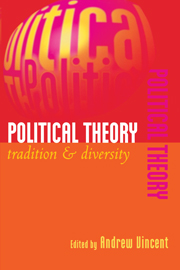Book contents
- Frontmatter
- Contents
- Preface
- List of Contributors
- Introduction
- 1 Political Theory and Conceptual Change
- 2 Political Theory and the Problem of Anachronism
- 3 Utilitarianism as a Public Philosophy
- 4 Rational Choice Political Theory
- 5 Republican Political Theory
- 6 Liberalism, Multiculturalism and Oppression
- 7 Postcolonialism and Political Theory
- 8 Legal Positivism and Political Power
- 9 Political Theory, International Theory, and the Political Theory of International Relations
- 10 Method Matters: Feminism, Interpretation and Politics
- 11 The Political Philosophy of Deleuze and Guattari
- 12 The Object of Political Theory
- Index
6 - Liberalism, Multiculturalism and Oppression
Published online by Cambridge University Press: 29 March 2011
- Frontmatter
- Contents
- Preface
- List of Contributors
- Introduction
- 1 Political Theory and Conceptual Change
- 2 Political Theory and the Problem of Anachronism
- 3 Utilitarianism as a Public Philosophy
- 4 Rational Choice Political Theory
- 5 Republican Political Theory
- 6 Liberalism, Multiculturalism and Oppression
- 7 Postcolonialism and Political Theory
- 8 Legal Positivism and Political Power
- 9 Political Theory, International Theory, and the Political Theory of International Relations
- 10 Method Matters: Feminism, Interpretation and Politics
- 11 The Political Philosophy of Deleuze and Guattari
- 12 The Object of Political Theory
- Index
Summary
Indeed, Hobbes, without being himself a liberal, had in him more of the philosophy of liberalism than most of its professed defenders.… It was Richard Cumberland with his ‘social instinct’ and later Adam Smith with his ‘social passions’ who bewitched liberalism by appearing to solve the problem of individualism when they had really only avoided it.
[Oakeshott n.d.: lvii and n.]So that in the nature of man, we find three principal causes of quarrel. First competition; secondly, diffidence; thirdly, glory.
[Hobbes n.d.: 81]The most persistent objection to liberal political theory has been to its individualism. Liberalism's critics often invoke the idea of community when taking it to task, partly because they wish to reject what they see as the liberal understanding of persons as separate and self-contained atoms, sharing certain formal rights – pre-eminent among these, the right to be left splendidly isolated.
Michael Sandel, for example, criticizes Rawls for advancing a political theory giving primacy to justice, and presupposing that justice is a virtue of a society peopled by separate individuals whose goals and values are as independent of society as they are. This typically liberal stance, for Sandel, is mistaken because it does not appreciate the extent to which individual selves – and their desires – are not separate from, but are constituted by, the community into which they are born.
- Type
- Chapter
- Information
- Political TheoryTradition and Diversity, pp. 132 - 153Publisher: Cambridge University PressPrint publication year: 1997
- 5
- Cited by



